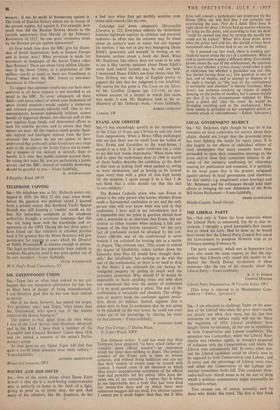POETRY AND SIDE-ISSUES
SIR,—One of the nicest things about Dame Edith Sitwell is that she is a hard-hitting controversialist who is perfectly at home in the thick of a fight, giving as good as, or better than, she gets. And many of her admirers, like Mr. Stapleton, do her
a bad turn when they get terribly sensitive even about mild remarks like my own.
Coleridge laid down adequately (Biographia Literaria, p. 225, Everyman edition) the distinction between legitimate asperity in criticism and personal rudeness—in effect that the reviewer may be blunt about an author's taste or talent but not impugn his motives. I was not in any way impugning Dame Edith's 'generosity and warmth' in writing an en- thusiastic preface about a book she liked. What Mr. Stapleton, like others, does not seem to be able to sec is that varioys opinions about Dame Edith's views (and indeed talents) may be and are held. I mentioned Dame Edith's one-time theory that Mr. Tom Driberg was the hope of English poetry to support the idea that her judgment is not infallible. My source for this point is The Crest on the Silver, by Mr. Geoffrey Grigson (pp. 113-114), an eye- witness account of a lecture in which this claim was made. I wish Mr. Stapleton luck in his re- discovery of Mr. Driberg's work.—Yours faithfully,














































 Previous page
Previous page